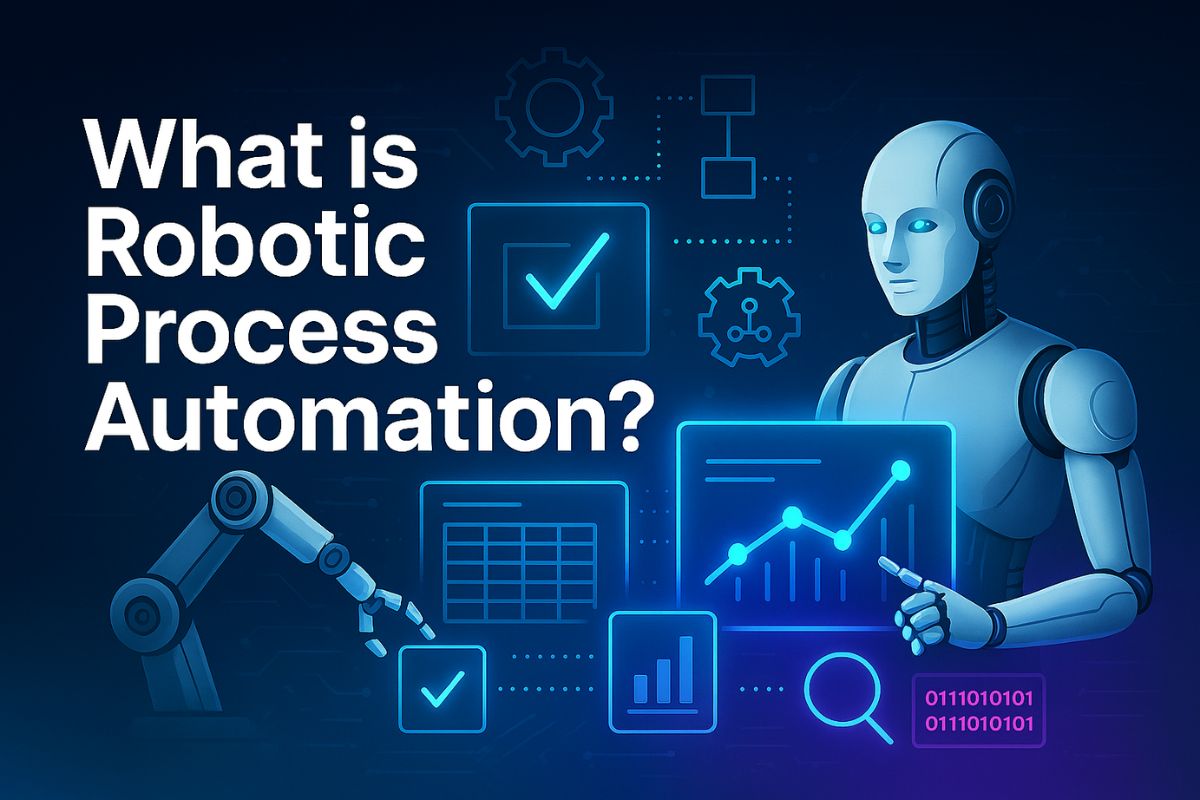Robotic Process Automation (RPA) is a powerful technology that uses bots to automate repetitive business processes. This blog explains what RPA is, how it works, benefits across industries, popular tools, real-life examples, and the future scope of RPA in India and beyond.
Businesses are constantly looking for ways to enhance productivity, reduce costs, and improve accuracy. One of the most promising technologies making this possible is Robotic Process Automation (RPA).
But what exactly is RPA?
Robotic Process Automation is a software technology that allows businesses to automate repetitive, rule-based tasks using software bots. These bots interact with applications just like humans—clicking, typing, copying data, sending emails—but without fatigue or error.
With rising adoption in India and globally, RPA is transforming industries from banking to healthcare. Let’s explore what RPA is, how it works, real-life examples, tools, benefits, and its exciting future.
1. What is Robotic Process Automation (RPA)?
A. RPA Definition
Robotic Process Automation (RPA) is a type of software that mimics human actions on digital systems to perform business processes. These bots follow predefined workflows to carry out tasks such as:
- Extracting data from emails
- Copy-pasting information between systems
- Generating reports
- Handling transactions
Unlike traditional software, RPA doesn’t require changing the existing IT infrastructure—it works on top of it.
B. How Does RPA Work?
RPA bots interact with the graphical user interface (GUI) of applications, just like a human would. They can:
- Log into systems
- Open and move files/folders
- Fill forms
- Perform calculations
- Read and write to databases
Core Components of RPA:
- Bot: Executes the task
- Orchestrator: Manages and monitors bots
- Designer: Used to create the automation workflows
2. Benefits of Robotic Process Automation
A. Key Benefits of RPA
Here’s why businesses are investing in RPA:
| Benefit | Description |
|---|---|
| Improved Accuracy | Bots reduce human errors in data entry and calculations |
| Faster Execution | Tasks are completed in minutes, not hours |
| Cost Savings | Organizations can save 30–60% in operational costs |
| Scalability | Bots can be scaled up or down quickly |
| Compliance | Every action is logged for audit purposes |
| Employee Satisfaction | Employees are freed from boring, repetitive tasks |
A 2024 Deloitte report showed 78% of global enterprises have already implemented RPA in at least one function.
B. Common Use Cases
Here’s how RPA is used across industries:
- Banking: KYC processing, loan approvals, compliance reporting
- Insurance: Claims processing, underwriting, policy renewals
- Healthcare: Patient data management, billing, scheduling
- Telecom: Service provisioning, fault management, billing
- Retail & E-commerce: Inventory updates, order processing
- HR: Employee onboarding, payroll, leave management
3. Real-Life RPA Examples & Tools
A. Real-Life Examples
- Citibank: Uses RPA to reduce loan processing time by 60%
- Cleveland Clinic: Automates appointment scheduling and billing
- Indian IT Firms: TCS and Infosys use RPA in internal operations and client services
- Automation Anywhere in India: Reported a 40% increase in enterprise RPA adoption post-COVID (source)
B. Popular RPA Tools in 2025
| Tool | Description |
|---|---|
| UiPath | Most popular enterprise-grade RPA tool; supports AI integration |
| Automation Anywhere | Easy to deploy with strong analytics |
| Blue Prism | Focus on secure, scalable enterprise automation |
| Microsoft Power Automate | Seamless integration with Office 365 |
| WorkFusion | Strong in financial compliance and document automation |
Most tools offer free community editions—great for students and small businesses.
4. Future Scope of RPA in India & Globally
A. Hyperautomation & AI Integration
The future of RPA lies in hyperautomation—a combination of RPA with AI, ML, NLP, and analytics. This enables bots to:
- Understand context
- Make decisions
- Continuously learn from data
B. Career Opportunities
With growing adoption, demand for RPA professionals is skyrocketing. Popular roles include:
- RPA Developer
- RPA Business Analyst
- RPA Solution Architect
- Automation Tester
Certifications from UiPath or Automation Anywhere can significantly boost job prospects.
C. India’s RPA Growth
India is a top outsourcing hub for RPA development. Startups, banks, telecom, and even government departments are deploying bots for internal processes and public service delivery.
5. Common Mistakes & Expert Tips
Mistakes to Avoid
- Automating unstable processes
- Ignoring compliance and bot governance
- Lack of change management
- Over-reliance on non-technical users
Tips for Success
- Start small with quick-win processes
- Involve both IT and business teams
- Use process mining to identify candidates
- Monitor and optimize bots regularly
- Stay updated on AI-RPA integration trends
6. Bonus Resources & Tools
- UiPath Academy (Free) – Online training and certifications
- Automation Anywhere University
- Open-source tools like TagUI and Robot Framework
Conclusion
Robotic Process Automation is revolutionizing how businesses operate. From reducing operational costs to improving efficiency, RPA is a must-have for companies looking to thrive in a digital world. As India moves towards a digitally-driven economy, RPA is poised to play a vital role in this transformation.
💡 Have questions or want to explore more? Drop a comment or check out our other blogs on digital technologies and career skills.
FAQs About RPA
1. What is RPA in simple words?
RPA is software that uses bots to automate repetitive tasks on computers, like data entry, emails, or generating reports.
2. Is RPA the same as AI?
No. RPA follows rules to perform tasks, while AI learns and adapts. However, RPA can integrate with AI for smarter automation.
3. What are some real-world RPA use cases?
RPA is used in banking (KYC), healthcare (billing), retail (inventory), HR (onboarding), and telecom (billing).
4. Which companies use RPA in India?
TCS, Infosys, HDFC Bank, SBI, and startups in fintech, logistics, and healthcare are active RPA users.
5. Is RPA a good career in India?
Yes. The demand for RPA developers, analysts, and architects is growing rapidly across sectors.
6. Can I learn RPA for free?
Yes. Platforms like UiPath Academy and Automation Anywhere offer free RPA courses and certifications.
7. What is the future of RPA?
RPA will evolve into hyperautomation with AI and ML. It will play a key role in digital transformation strategies globally.



